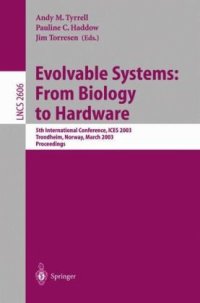
Ebook: Evolvable Systems: From Biology to Hardware: 5th International Conference, ICES 2003 Trondheim, Norway, March 17–20, 2003 Proceedings
- Genre: Education // International Conferences and Symposiums
- Tags: Computation by Abstract Devices, Logic Design, Artificial Intelligence (incl. Robotics), Simulation and Modeling, Computer-Aided Engineering (CAD CAE) and Design, Bioinformatics
- Series: Lecture Notes in Computer Science 2606
- Year: 2003
- Publisher: Springer-Verlag Berlin Heidelberg
- Edition: 1
- Language: English
- pdf
The idea of evolving machines, whose origins can be traced to the cybernetics movementofthe1940sand1950s,hasrecentlyresurgedintheformofthenascent ?eld of bio-inspired systems and evolvable hardware. The inaugural workshop, Towards Evolvable Hardware, took place in Lausanne in October 1995, followed by the First International Conference on Evolvable Systems: From Biology to Hardware (ICES), held in Tsukuba, Japan in October 1996. The second ICES conference was held in Lausanne in September 1998, with the third and fourth being held in Edinburgh, April 2000 and Tokyo, October 2001 respectively. This has become the leading conference in the ?eld of evolvable systems and the 2003 conference promised to be at least as good as, if not better than, the four that preceeded it. The ?fth international conference was built on the success of its predec- sors, aiming at presenting the latest developments in the ?eld. In addition, it brought together researchers who use biologically inspired concepts to imp- ment real systems in arti?cial intelligence, arti?cial life, robotics, VLSI design and related domains. We would say that this ?fth conference followed on from the previous four in that it consisted of a number of high-quality interesting thought-provoking papers.
This book constitutes the refereed proceedings of the 5th International Conference on Evolvable Systems, ICES 2003, held in Trondheim, Norway in March 2003.
The 41 revised full papers presented were carefully reviewed and selected from 58 submissions. The papers are organized in topical sections on evolution, fault tolerance and fault recovery, evolutionary development, POEtic tissue and circuits, applications, evolution of digital circuits, hardware challenges, evolutionary hardware, neural systems, logic design, evolution strategies, and future technologies.